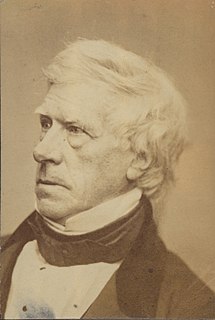A Quote by Henry Brougham, 1st Baron Brougham and Vaux
Give a child the habit of sacredly regarding the truth - of carefully respecting the property of others - of scrupulously abstaining from all acts of improvidence which can involve him in distress, and he will just as likely think of rushing into the element in which he cannot breathe, as of lying or cheating or stealing.
Related Quotes
Correct is to recognize what diseases are and whence they come; which are long and which are short; which are mortal and which are not; which are in the process of changing into others; which are increasing and which are diminishing; which are major and which are minor; to treat the diseases that can be treated, but to recognize the ones that cannot be, and to know why they cannot be; by treating patients with the former, to give them the benefit of treatment as far as it is possible.
It is not the right of property which is protected, but the right to property. Property, per se, has no rights; but the individual - the man - has three great rights, equally sacred from arbitrary interference: the right to his life, the right to his liberty, the right to his property The three rights are so bound together as to be essentially one right. To give a man his life but to deny him his liberty, is to take from him all that makes his life worth living. To give him his liberty but take from him the property which is the fruit and badge of his liberty is to still leave him a slave.
It is as his own mind comes into contact with others that truth will begin to acquire value in the child's eyes and will consequently become a moral demand that can be made upon him. As long as the child remains egocentric, truth as such will fail to interest him and he will see no harm in transposing facts in accordance with his desires.
If it had not been for the pernicious power of envy, men would not so have exalted vengeance above innocence and profit above justice... in these acts of revenge on others, men take it upon themselves to begin the process of repealing those general laws of humanity which are there to give a hope of salvation to all who are in distress.
He who cannot find time to consult his Bible will one day find he has time to be sick; he who has no time to pray must find time to die; he who can find no time to reflect is most likely to find time to sin; he who cannot find time for repentance will find an eternity in which repentance will be of no avail; he who cannot find time to work for others may find an eternity in which to suffer for himself.
You cannot speak that which you do not know. You cannot share that which you do not feel. You cannot translate that which you do not have. And you cannot give that which you do not possess. To give it and to share it, and for it to be effective, you first need to have it. Good communication starts with good preparation.
Truth should be the first lesson of the child and the last aspiration of manhood; for it has been well said that the inquiry of truth, which is the love-making of it, the knowledge of truth, which is the presence of it, and the belief of truth, which is the enjoying of it, is the sovereign good of human nature.












































